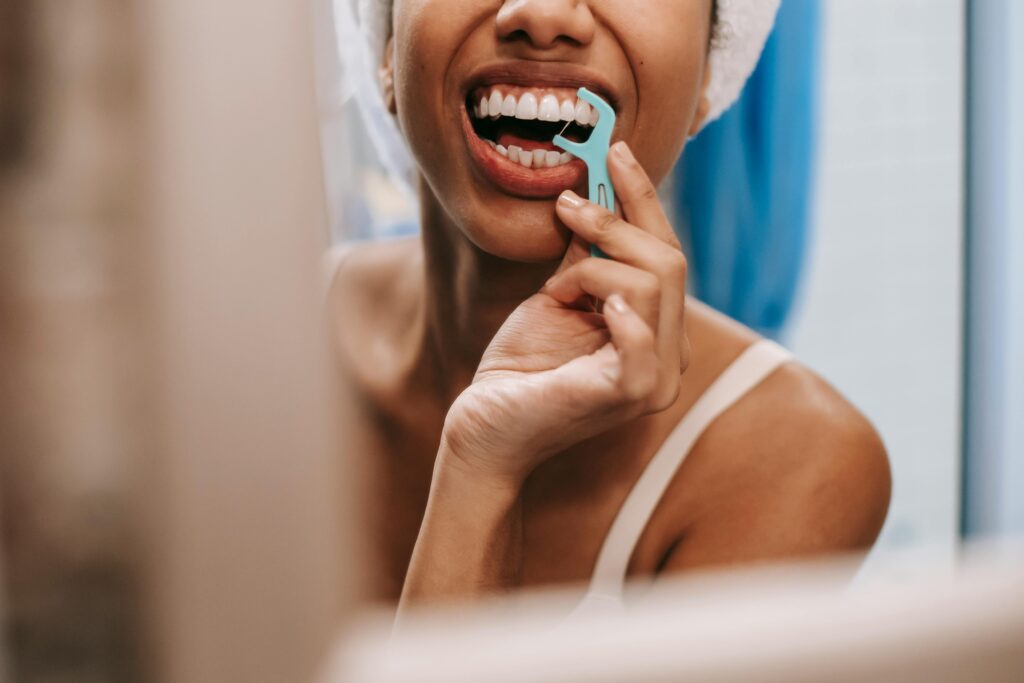If you’ve ever had an exam at the dentist, I’m sure you’ve been asked the dreaded question: “do you floss?” If you’re like most, this question, despite the good intention of the dentists and hygienists behind it, can leave you feeling somehow judged or guilty. Perhaps you even fib and tell your dentist that “yes!” of course you floss daily – just to prevent the lecture that you are sure will follow if you were to tell the truth, being that being you haven’t flossed in ages.
Trust me, you’re not alone in this. Did you know that only 1 in 3 Americans floss daily? And according to some dentists, the number is actually even lower. So why do so many resist flossing? Perhaps it’s the hassle of another step in an already tedious seeming oral hygiene routine, or maybe it’s the awkward maneuvering of that tiny little string that seems to scare people away. Whatever the reason, everybody seems to enthusiastically jump on the anti-floss train whenever an article or media report touts flossing as not strictly necessary. But is this the truth?
As a dentist, I’m here to shed some light on this touchy subject and help you decide whether you really should add this step to your nightly routine.
What Does Flossing Really Do?
Flossing is all about reaching those tight spaces in between your teeth and under the gum-line where your toothbrush can’t reach. By getting in there, the floss removes stubborn food particles and plaque – the sticky, bacteria-filled film that causes gum disease and cavities. When plaque is routinely scraped away with floss, it doesn’t have the chance to turn into that hardened, gum-disease causing tartar that can only be removed by dentists and dental hygienists.
By removing both plaque and food particles, flossing greatly reduces the number of harmful bacteria and prevents them from creating an oral environment where cavities and gum disease thrive.
The next time you try flossing, check out the floss string a little bit closer once you clean between each tooth. I guarantee you’ll see pieces of that mornings breakfast or that nights dinner stuck to the floss.
The Science Behind Flossing
Ok, so now we know that flossing removes food and plaque, and that it theoretically decreases your risk of gum disease and cavities. But what does the science say?
This topic has been studied relatively frequently in the dental community, and the results are a bit complicated. On the one hand, there are a significant number of studies demonstrating that flossing overwhelmingly reduces plaque build-up and the occurrence of gingivitis (gum-disease). On the other hand, flossing may not be as critical when it comes to cavity prevention. According to some studies, while it does have a protective effect against tooth decay, it may not be as significant as tooth brushing and diet. What we can take from this, however, is clear – flossing absolutely helps protect against gum disease. Not only this, but it helps stimulate and increases blood flow to the gums which promotes healthier, more resilient tissue.
What Happens If You Don’t Floss
If you decide to forego flossing, what actually occurs inside your mouth?
First things first – old food and plaque start to accumulate in between your teeth and along your gum-line. This increases the number of bad bacteria in your mouth and can lead to gum inflammation and eventually, gum disease like gingivitis and periodontitis. It’s important to remember that severe gum disease, over time, can lead to tooth loss. You’ll also notice that on the occasion that you do floss, if not done regularly, it will cause gums to bleed and hurt from the built up inflammation.
Not only this, but a notable and understandable symptom of not removing those food materials from between your teeth is: bad breath. The breakdown of proteins in that food leads to the production of volatile sulfur compounds like hydrogen sulfide, which smells like rotten eggs, and methyl mercaptan, which smells like rotting cabbage. Yuck! If you want to prove to yourself whether this really happens, try smelling the floss after you use it and you’ll experience a small whiff of what could build up in your mouth over time.
Alternatives To Traditional Flossing
I get it. Flossing is annoying. Most of my patients hate using that traditional floss string and not to mention, plenty of people do not have the ability or dexterity to do so, whether because of arthritis or other medical conditions. Thankfully, using traditional floss string is not your only option.
Here are some alternatives I frequently recommend to my patients:
- Floss Picks: While not as effect as traditional floss (they don’t properly hug the teeth), this is a great alternative to string floss. Try these out to start.
- Water Flossers: The most common water flosser is a Waterpik,
- Interdental Brushes: Brushes have tiny, gentle bristles that are very effective at removing plaque. They are great for those with wide gaps between their teeth or for those undergoing orthodontic treatment. I typically suggest my patients with braces incorporate proxabrushes in to their routine.
- Soft Picks: These small, flexible picks are gentle and great for those with sensitive gums. These have soft, rubber bristles and are my most recommended.
Final Thoughts
So, do you actually need to floss? My opinion is overwhelmingly that: yes, you do. Whether you use traditional string floss, or opt for an alternative method, you really should be doing at least something to remove old food and plaque from between your teeth. Trust me, your gums will thank you. And as a bonus, you get to avoid some serious bad breath causing bacteria – it’s a win win.
What type of oral hygiene step do you want me to talk about next? Let me know in the comments!
~Dr. Lee

